Artificial intelligence has been a game-changer in many industries, and engineering is no exception. One such AI-powered tool is ChatGPT, which has the potential to revolutionize the way engineers approach learning and practical knowledge.
At GPTPromptsHub, we understand the importance of leveraging AI-generated prompts for engineers to improve their skills and expertise. In this blog post, we will explore 10 long-form prompts for various engineering use cases and discuss how these prompts can help you enhance your engineering career.
Civil Engineering ChatGPT Prompts
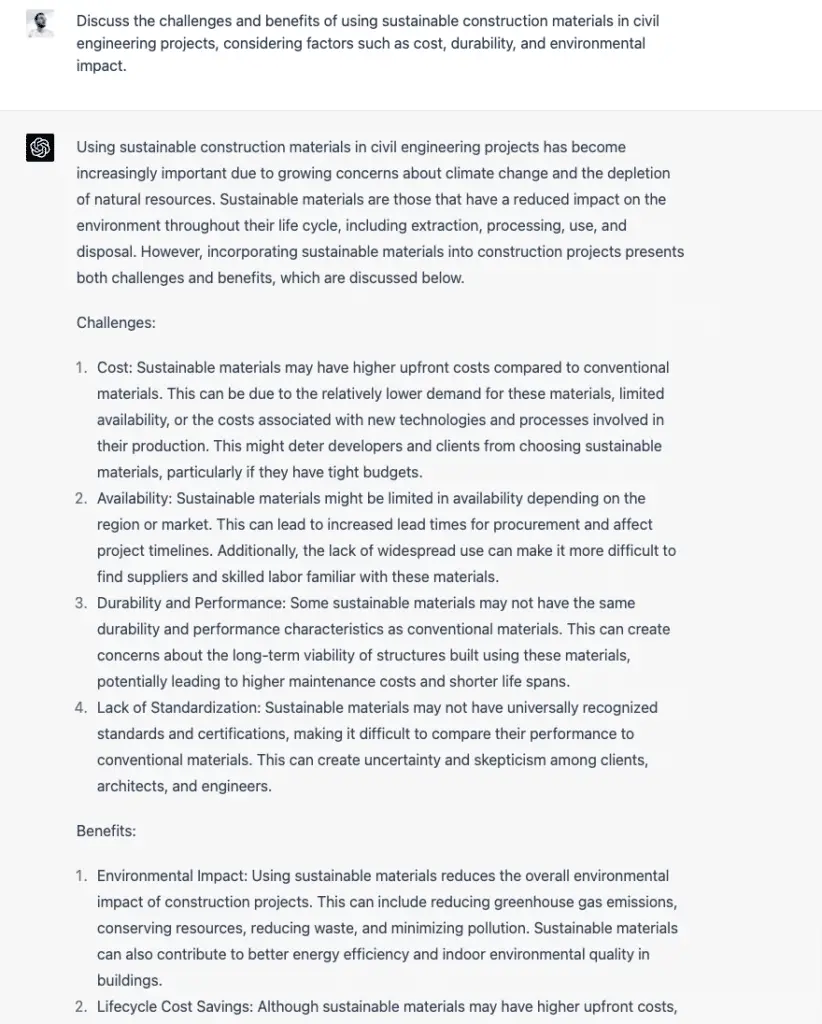
- Discuss the challenges and benefits of using sustainable construction materials in civil engineering projects, considering factors such as cost, durability, and environmental impact.
- Analyze the role of geotechnical engineering in mitigating the risks associated with natural disasters such as earthquakes, landslides, and floods.
- Evaluate the advantages and limitations of various types of bridges, including arch, suspension, and cable-stayed bridges, and discuss their suitability for different site conditions and loads.
- Explore the importance of transportation planning in urban environments, including its impact on traffic flow, safety, and overall quality of life for residents.
- Describe the process of constructing a wastewater treatment plant, focusing on the primary, secondary, and tertiary treatment stages and the role of various technologies in each stage.
- Discuss the principles of soil stabilization and their application in various civil engineering projects, such as roads, embankments, and foundations.
- Examine the factors that influence the selection of appropriate foundation types for various building structures, considering soil conditions, load-bearing capacity, and environmental constraints.
- Analyze the role of building information modelling (BIM) in civil engineering projects, focusing on its benefits for design, construction, and facility management.
- Evaluate the impact of climate change on the design and construction of civil engineering infrastructure, such as bridges, roads, and dams.
- Explore the challenges and opportunities of using prefabrication and modular construction techniques in civil engineering projects, considering factors such as cost, time, and quality control.
Mechanical Engineering ChatGPT Prompts

- Discuss the principles of thermodynamics and their application in the design and operation of heat engines, refrigeration systems, and heat exchangers.
- Analyze the role of computational fluid dynamics (CFD) in optimizing the performance of mechanical systems, such as turbines, pumps, and HVAC systems.
- Evaluate the benefits and limitations of various materials used in mechanical engineering, including metals, polymers, and composites, and their suitability for different applications.
- Explore the importance of lubrication in the performance and longevity of mechanical systems, including the selection of appropriate lubricants and lubrication methods.
- Describe the process of designing and manufacturing a gear system, focusing on the selection of gear types, materials, and manufacturing methods.
- Discuss the principles of vibration analysis and their application in the diagnosis and prevention of mechanical failures in rotating machinery.
- Examine the factors that influence the selection of appropriate fastening methods for mechanical assemblies, such as bolts, rivets, and welding.
- Analyze the role of robotics and automation in modern manufacturing processes, including the benefits and challenges associated with their implementation.
- Evaluate the impact of additive manufacturing (3D printing) on the mechanical engineering industry, including its potential to revolutionize design, prototyping, and production processes.
- Explore the challenges and opportunities of developing energy-efficient mechanical systems, such as engines, pumps, and HVAC systems, considering factors such as cost, performance, and environmental impact.
Electrical Engineering ChatGPT Prompts
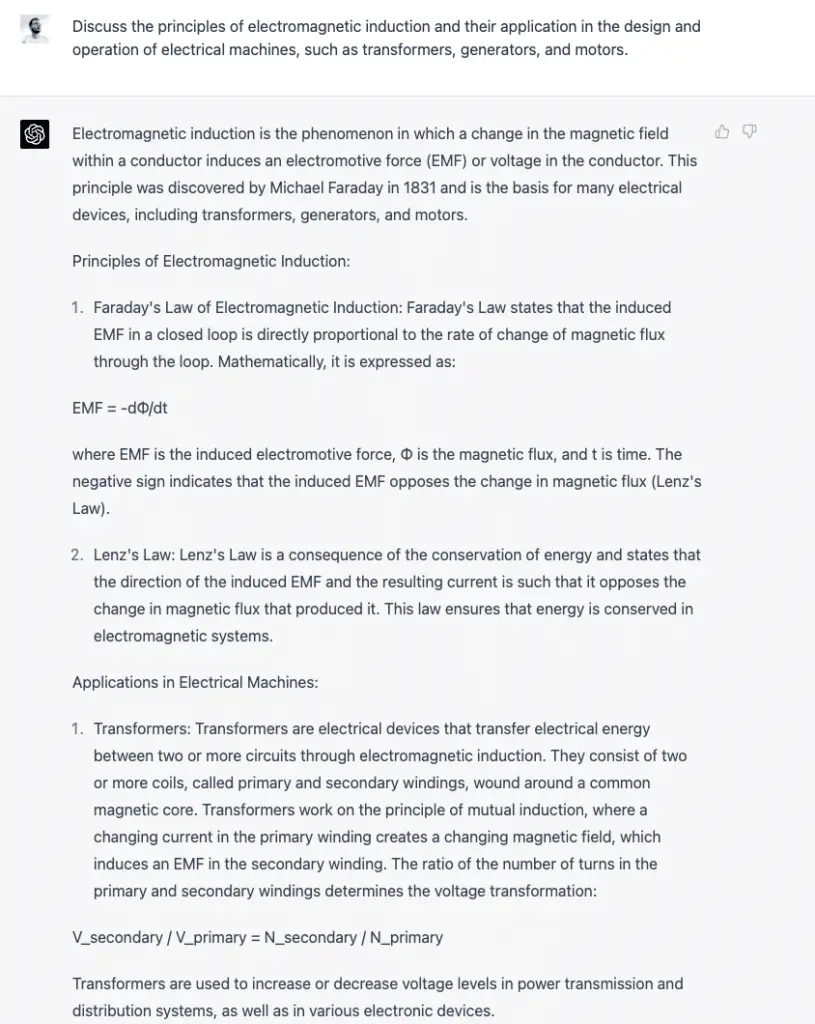
- Discuss the principles of electromagnetic induction and their application in the design and operation of electrical machines, such as transformers, generators, and motors.
- Analyze the role of power electronics in modern electrical systems, focusing on the benefits and challenges of using various types of converters, inverters, and rectifiers.
- Evaluate the advantages and limitations of different energy storage technologies, including batteries, capacitors, and flywheels, and their suitability for various electrical applications.
- Explore the importance of power quality in electrical systems, including its impact on equipment performance, reliability, and energy efficiency.
- Describe the process of designing and implementing a smart grid, focusing on the integration of renewable energy sources, demand response, and advanced metering infrastructure.
- Discuss the principles of digital signal processing and their application in various electrical engineering fields, such as communications, control systems, and audio processing.
- Examine the factors that influence the selection of appropriate transmission and distribution systems for electrical power, considering voltage levels, distance, and load requirements.
- Analyze the role of microcontrollers and embedded systems in modern electrical engineering applications, such as automotive systems, home automation, and industrial control.
- Evaluate the impact of the Internet of Things (IoT) on the electrical engineering industry, including its potential to revolutionize the way we design, monitor, and control electrical systems.
- Explore the challenges and opportunities of developing energy-efficient electrical systems, such as lighting, motors, and power supplies, considering factors such as cost, performance, and environmental impact.
Computer Engineering ChatGPT Prompts
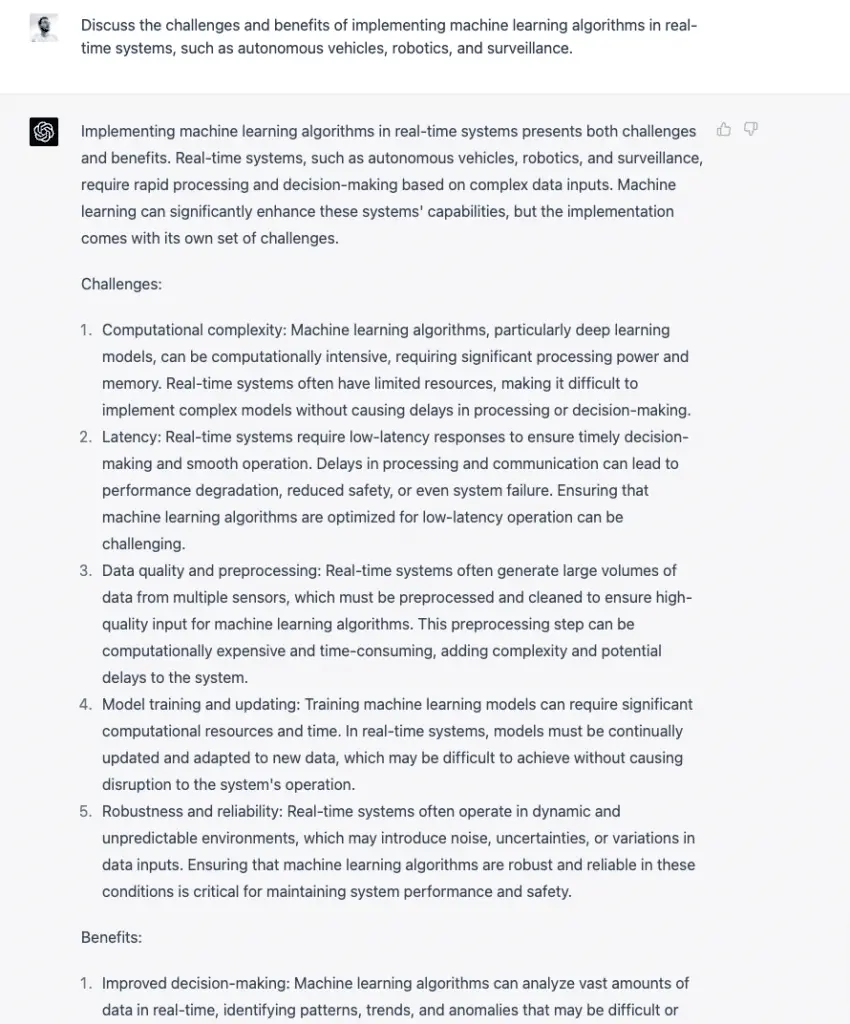
- Discuss the challenges and benefits of implementing machine learning algorithms in real-time systems, such as autonomous vehicles, robotics, and surveillance.
- Analyze the role of cybersecurity in modern computer engineering, focusing on strategies to mitigate potential threats and ensure the integrity of data and systems.
- Evaluate the impact of quantum computing on the future of computer engineering, considering its potential to revolutionize problem-solving and computation speeds.
- Explore the importance of parallel computing in high-performance computing applications, such as weather forecasting, computational fluid dynamics, and large-scale data processing.
- Describe the process of designing an efficient and scalable computer network, including considerations for topology, routing algorithms, and traffic management.
- Discuss the principles of computer graphics and their application in various industries, such as gaming, animation, and virtual reality.
- Examine the factors that influence the selection of appropriate data storage solutions for various computer engineering applications, considering speed, capacity, and security requirements.
- Analyze the role of embedded systems in modern computer engineering, focusing on applications in automotive, aerospace, and consumer electronics.
- Evaluate the impact of cloud computing on the computer engineering industry, including its potential to streamline software development, data storage, and system management.
- Explore the challenges and opportunities associated with developing energy-efficient computer systems, considering factors such as processing power, memory, and cooling solutions.
Check out Best ChatGPT Prompts For Developers
Chemical Engineering ChatGPT Prompts
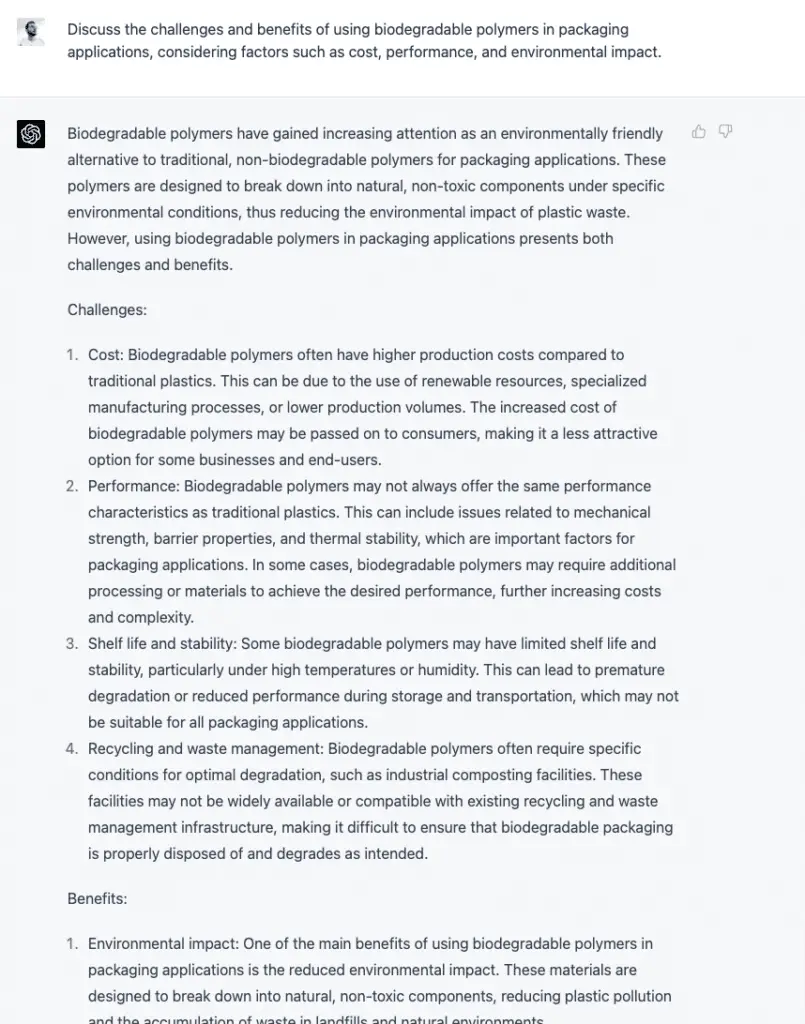
- Discuss the challenges and benefits of using biodegradable polymers in packaging applications, considering factors such as cost, performance, and environmental impact.
- Analyze the role of process optimization in the chemical engineering industry, focusing on strategies to improve production efficiency and minimize waste.
- Evaluate the potential of nanotechnology in revolutionizing various chemical engineering applications, such as drug delivery, water treatment, and energy storage.
- Explore the importance of safety and hazard analysis in chemical engineering processes, including techniques to identify, assess, and mitigate potential risks.
- Describe the process of designing an efficient and environmentally friendly chemical plant, considering factors such as energy consumption, emissions, and waste management.
- Discuss the principles of catalysis and their application in various chemical engineering processes, such as fuel production, pollution control, and chemical synthesis.
- Examine the factors that influence the selection of appropriate separation techniques for various chemical engineering applications, considering efficiency, cost, and environmental impact.
- Analyze the role of bioprocessing in the production of pharmaceuticals, biofuels, and other valuable products, focusing on the advantages and challenges associated with this approach.
- Evaluate the impact of green chemistry principles on the chemical engineering industry, including their potential to promote sustainable development and reduce environmental pollution.
- Explore the challenges and opportunities associated with developing renewable and alternative energy sources, such as solar, wind, and bioenergy, from a chemical engineering perspective.
Aerospace Engineering ChatGPT Prompts
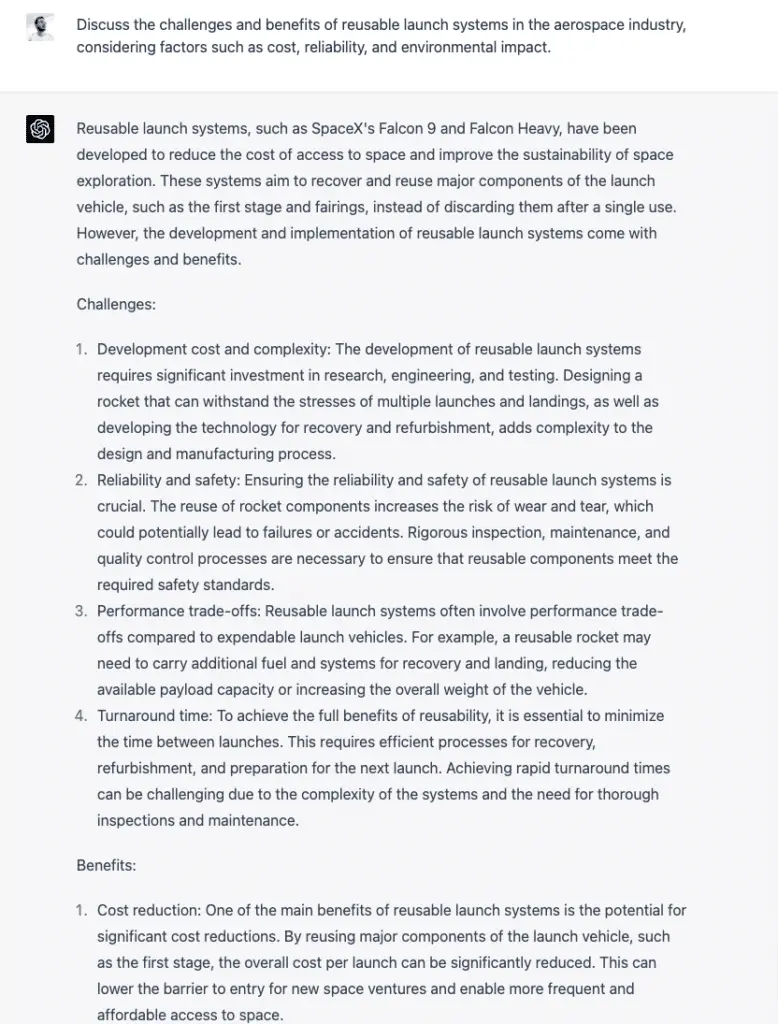
- Discuss the challenges and benefits of reusable launch systems in the aerospace industry, considering factors such as cost, reliability, and environmental impact.
- Analyze the role of computational fluid dynamics in the design and optimization of aerospace vehicles, such as aircraft, rockets, and satellites.
- Evaluate the potential of hypersonic flight in revolutionizing the aerospace industry, considering factors such as speed, fuel efficiency, and safety.
- Explore the importance of materials science in the development of lightweight and durable aerospace structures, such as airframes, engines, and thermal protection systems.
- Describe the process of designing and implementing a satellite constellation for global communications, navigation, or Earth observation purposes.
- Discuss the principles of aerodynamics and their application in the design and performance of various aerospace vehicles, such as fixed-wing aircraft, helicopters, and unmanned aerial vehicles (UAVs).
- Examine the factors that influence the selection of appropriate propulsion systems for various aerospace applications, considering efficiency, power-to-weight ratio, and environmental impact.
- Analyze the role of avionics in modern aerospace systems, focusing on applications in navigation, communication, and flight control.
- Evaluate the impact of additive manufacturing (3D printing) on the aerospace industry, including its potential to streamline production processes and enable the creation of complex geometries.
- Explore the challenges and opportunities associated with developing space exploration missions, such as manned missions to Mars, asteroid mining, and space tourism.
Biomedical Engineering ChatGPT Prompts
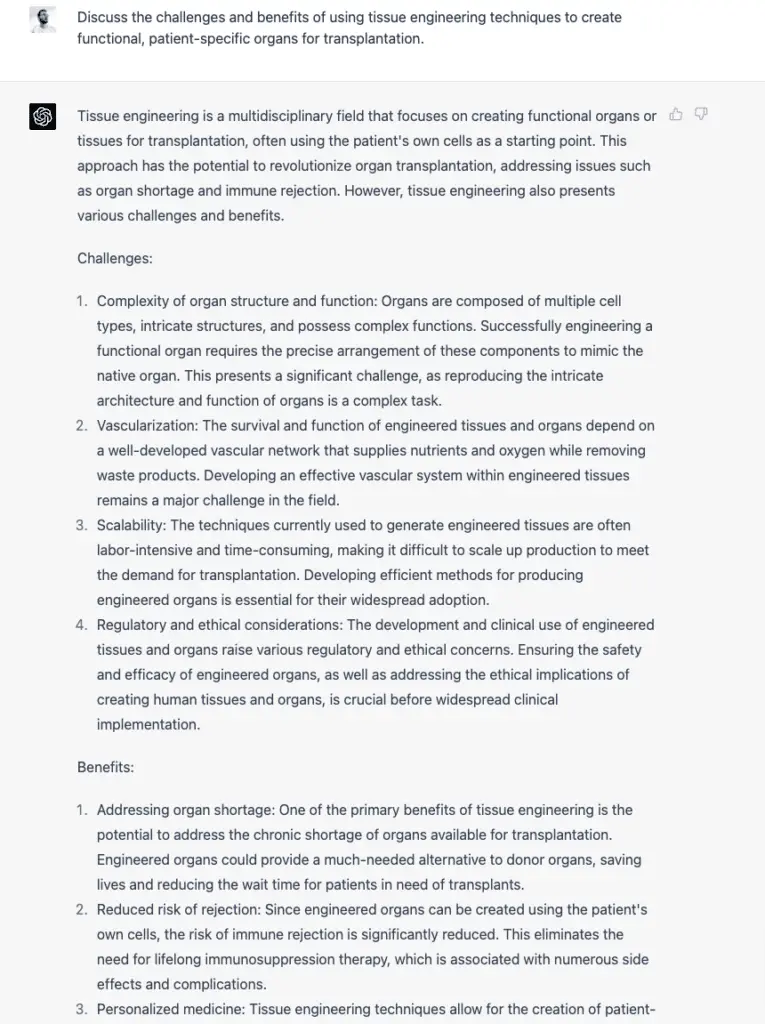
- Discuss the challenges and benefits of using tissue engineering techniques to create functional, patient-specific organs for transplantation.
- Analyze the role of medical imaging technologies, such as MRI, CT, and ultrasound, in the diagnosis and treatment of various medical conditions.
- Evaluate the potential of nanomedicine in revolutionizing drug delivery, diagnostics, and regenerative medicine.
- Explore the importance of biomechanics in the design and development of medical devices, such as prosthetics, orthotics, and surgical instruments.
- Describe the process of designing and implementing a telemedicine system to improve healthcare access and quality in remote or underserved areas.
- Discuss the principles of neural engineering and their application in the development of brain-computer interfaces, neuroprosthetics, and other neurotechnology.
- Examine the factors that influence the selection of appropriate biomaterials for various biomedical engineering applications, considering biocompatibility, mechanical properties, and degradation characteristics.
- Analyze the role of genomics and personalized medicine in the future of healthcare, focusing on the potential to tailor treatments and therapies to individual patients.
- Evaluate the impact of wearable and implantable medical devices on patient care and healthcare delivery, including considerations for functionality, safety, and patient privacy.
- Explore the challenges and opportunities associated with developing novel therapies and technologies for the treatment of chronic diseases, such as diabetes, cancer, and heart disease.
Environmental Engineering ChatGPT Prompts

- Discuss the challenges and benefits of using green infrastructure to mitigate the effects of urbanization on stormwater management, air quality, and urban heat island effects.
- Analyze the role of water treatment technologies, such as membrane filtration, advanced oxidation, and biological processes, in ensuring safe and sustainable water supplies.
- Evaluate the potential of renewable energy systems, such as solar, wind, and hydropower, in reducing greenhouse gas emissions and promoting sustainable development.
- Explore the importance of waste management and recycling strategies in minimizing the environmental impact of human activities and conserving natural resources.
- Describe the process of conducting an environmental impact assessment for a proposed industrial or infrastructure project, considering factors such as air and water quality, biodiversity, and socio-economic impacts.
- Discuss the principles of ecological engineering and their application in the design and management of ecosystems for environmental restoration, habitat conservation, and resource production.
- Examine the factors that influence the selection of appropriate remediation technologies for contaminated sites, such as soil, groundwater, and surface water.
- Analyze the role of environmental monitoring and modelling in predicting and managing the effects of human activities on natural systems, such as air and water quality, climate change, and habitat loss.
- Evaluate the impact of environmental policies and regulations on industry practices, technological innovation, and environmental protection.
- Explore the challenges and opportunities associated with developing sustainable and resilient urban systems, considering factors such as transportation, energy, and land use.
Industrial Engineering ChatGPT Prompts

- Discuss the challenges and benefits of implementing lean manufacturing principles in industrial operations, focusing on waste reduction, process optimization, and continuous improvement.
- Analyze the role of simulation and modelling in the design and optimization of industrial systems, such as production lines, logistics networks, and supply chains.
- Evaluate the potential of automation and robotics in transforming the industrial sector, considering factors such as productivity, workforce impacts, and safety.
- Explore the importance of ergonomics and human factors in the design and management of workspaces, equipment, and processes to ensure worker health, safety, and productivity.
- Describe the process of conducting a time and motion study to analyze and optimize industrial processes, considering factors such as task sequence, equipment utilization, and worker efficiency.
- Discuss the principles of quality management and their application in various industrial settings, such as manufacturing, healthcare, and service industries.
- Examine the factors that influence the selection of appropriate inventory control methods and strategies, considering aspects such as demand forecasting, lead times, and carrying costs.
- Analyze the role of project management in the successful execution of industrial projects, focusing on planning, scheduling, resource allocation, and risk management.
- Evaluate the impact of sustainable and green manufacturing practices on the industrial sector, including considerations for energy efficiency, waste reduction, and environmental stewardship.
- Explore the challenges and opportunities associated with developing and implementing innovative industrial technologies, such as additive manufacturing, augmented reality, and the Internet of Things (IoT).
Material Science Engineering ChatGPT Prompts
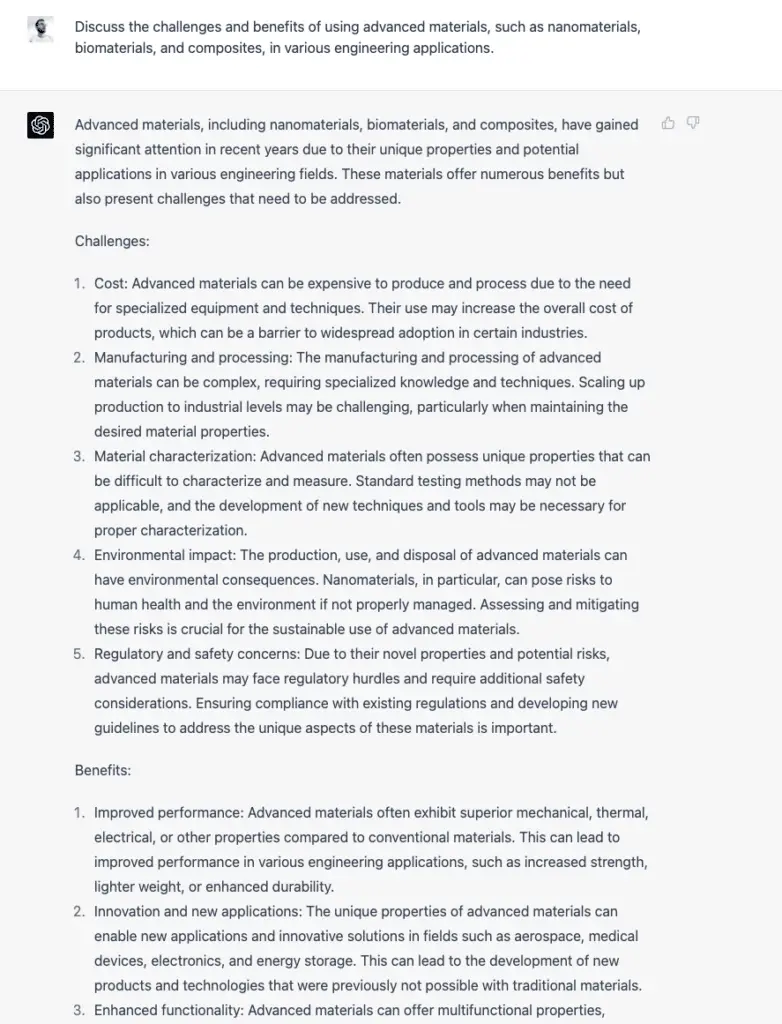
- Discuss the challenges and benefits of using advanced materials, such as nanomaterials, biomaterials, and composites, in various engineering applications.
- Analyze the role of materials characterization techniques, such as microscopy, spectroscopy, and mechanical testing, in understanding and optimizing material properties and performance.
- Evaluate the potential of smart materials, such as shape-memory alloys, self-healing polymers, and piezoelectric materials, in revolutionizing various industries, including aerospace, automotive, and biomedical.
- Explore the importance of materials selection and design in the development of sustainable products and systems, considering factors such as material properties, lifecycle impacts, and recycling potential.
- Describe the process of designing and fabricating a new material with tailored properties for a specific engineering application, such as lightweight structural components or high-performance electronic devices.
- Discuss the principles of materials processing, such as casting, forging, and additive manufacturing, and their influence on material properties and performance.
- Examine the factors that influence the selection of appropriate joining techniques for various materials and applications, considering aspects such as strength, durability, and process efficiency.
- Analyze the role of materials science in the development of next-generation energy technologies, such as advanced batteries, fuel cells, and solar cells.
- Evaluate the impact of materials research and development on the advancement of new technologies and industries, including nanotechnology, biotechnology, and advanced manufacturing.
- Explore the challenges and opportunities associated with developing novel materials and processes to address pressing global challenges, such as climate change, resource scarcity, and population growth.
How Engineers Can Benefit from ChatGPT Prompts?
Using ChatGPT prompts can significantly enhance an engineer’s learning and practical knowledge in several ways:
- Streamlining research and ideation: ChatGPT-generated content can help engineers explore new ideas and concepts quickly and efficiently, providing a solid foundation for further research and development.
- Improving communication and presentation skills: By utilizing AI-generated prompts, engineers can hone their writing and presentation skills, making it easier to communicate complex ideas and concepts to colleagues, clients, and stakeholders.
- Enhancing problem-solving capabilities: ChatGPT prompts can help engineers tackle complex engineering challenges by generating potential solutions and approaches, allowing them to think outside the box and consider a wide range of possibilities.
- Expanding interdisciplinary knowledge: AI-generated prompts can expose engineers to different engineering disciplines, fostering a broader understanding of the engineering field and promoting cross-disciplinary collaboration.
Frequently Asked Questions?
1. How can ChatGPT prompts help engineers in their daily tasks?
ChatGPT prompts can assist engineers in various tasks, including research, ideation, problem-solving, and communication. By generating AI-generated content, engineers can quickly explore new ideas, develop potential solutions, and effectively communicate their concepts and findings to others.
2. Are ChatGPT-generated prompts reliable for engineering applications?
While ChatGPT-generated content can provide valuable insights and ideas, it is essential to verify the accuracy and relevance of the information. Engineers should always cross-reference AI-generated content with reliable sources and use their expertise to assess its applicability to specific engineering problems.
3. How can engineers ensure the accuracy and relevance of ChatGPT-generated content?
Engineers can improve the accuracy and relevance of ChatGPT-generated content by providing clear and specific prompts, reviewing the generated content, and cross-referencing it with reliable sources. Additionally, combining AI-generated content with their expertise can result in a more accurate and comprehensive understanding of the subject matter.
4. Can ChatGPT prompts be used for engineering education and training?
Yes, ChatGPT prompts can be a valuable tool for engineering education and training, as they can generate content that helps students explore various engineering topics, develop problem-solving skills, and enhance their communication abilities. However, it is essential to ensure that the AI-generated content is accurate and relevant and to supplement it with guidance from experienced instructors and reliable educational resources.
Conclusion
AI-generated prompts, such as those from ChatGPT, have the potential to revolutionize the way engineers approach learning and practical knowledge. By leveraging these prompts, engineers can streamline research, enhance problem-solving capabilities, improve communication skills, and expand their interdisciplinary knowledge.
As the field of AI continues to advance, it is crucial for engineers to stay informed and adapt to new technologies that can enhance their careers and revolutionize the engineering industry. By exploring the amazing world of ChatGPT prompts, engineers can unlock the full potential of AI and experience the benefits it offers in their daily work and learning experiences.


